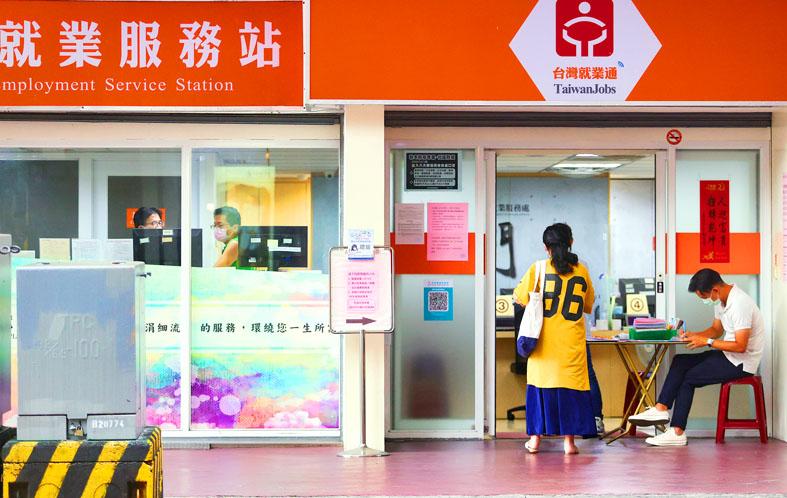The unemployment rate in May climbed to 4.11 percent, gaining 0.47 percentage points from one month earlier to the highest level in seven-and-a-half years, as a local COVID-19 outbreak put many people out of work, the Directorate-General of Budget, Accounting and Statistics (DGBAS) said yesterday.
The data suggest an unemployed population of 489,000, a 12.35 percent spike from April, as the government ordered a temporary shutdown of all recreational and cultural facilities, and banned dine-in services at restaurants.
Businesses that are allowed to operate have seen their revenue dwindle as people stay home to avoid infection.

Photo: CNA
“The ongoing virus outbreak hit the job market harder this time than last year in light of more infections and the level 3 alert, which induced a sudden freeze in consumer activity,” DGBAS Deputy Director Chen Hui-hsin (陳惠欣) told an online news conference in Taipei.
The statistics agency postponed the release of May unemployment data from June 25 to yesterday to better reflect reality, Chen said.
The latest survey was conducted from May 23 to Tuesday last week, one week later than usual, she said.
Chen said she expects last month’s unemployment rate to be worse due to lingering restrictions on movement and gatherings, and the arrival of the graduation season.
The nation’s workforce in May shrank 1.09 percent to 11.39 million following 126,000 job losses, the worst figure for the month, Chen said.
Most job losses were among service providers at 86,000, compared with 40,000 in the manufacturing sector, she said.
The pinch was acutely felt by restaurants, retailers, wholesalers and non-school educational facilities, the official said, adding that the real situation could be worse, as the data do not factor in people involved in the underground economy, such as food vendors at night markets and self-employed YouTubers.
However, people who exited the market would not be listed as unemployed, which accounts for a gap between job losses and an increase of 54,000 in the number of unemployed people, she said.
By education breakdown, people with university degrees had the highest unemployment rate of 5.56 percent, followed by high-school graduates at 4 percent and people with junior-high education at 3.23 percent. People with graduate degrees had an unemployment rate of 3.15 percent and people with junior-high college education had an unemployment rate of 2.93 percent, it added.
People aged 20 to 24 had the highest unemployment rate at 12.58 percent, followed by 15-to-19-year-olds at 8.58 percent and 25-to-29-year-olds at 6.9 percent, it said.
People aged 40 to 44 had an unemployment rate of 2.98 percent and people aged 45 to 64 had an unemployment rate of 2.74 percent, the DGBAS said.
The nation’s unemployment rate is higher than Japan’s 3.1 percent and South Korea’s 4 percent, but better than Hong Kong’s 6 percent, it said.

‘ABUSE OF POWER’: Lee Chun-yi allegedly used a Control Yuan vehicle to transport his dog to a pet grooming salon and take his wife to restaurants, media reports said Control Yuan Secretary-General Lee Chun-yi (李俊俋) resigned on Sunday night, admitting that he had misused a government vehicle, as reported by the media. Control Yuan Vice President Lee Hung-chun (李鴻鈞) yesterday apologized to the public over the issue. The watchdog body would follow up on similar accusations made by the Chinese Nationalist Party (KMT) and would investigate the alleged misuse of government vehicles by three other Control Yuan members: Su Li-chiung (蘇麗瓊), Lin Yu-jung (林郁容) and Wang Jung-chang (王榮璋), Lee Hung-chun said. Lee Chun-yi in a statement apologized for using a Control Yuan vehicle to transport his dog to a

INDO-PACIFIC REGION: Royal Navy ships exercise the right of freedom of navigation, including in the Taiwan Strait and South China Sea, the UK’s Tony Radakin told a summit Freedom of navigation in the Indo-Pacific region is as important as it is in the English Channel, British Chief of the Defence Staff Admiral Tony Radakin said at a summit in Singapore on Saturday. The remark came as the British Royal Navy’s flagship aircraft carrier, the HMS Prince of Wales, is on an eight-month deployment to the Indo-Pacific region as head of an international carrier strike group. “Upholding the UN Convention on the Law of the Sea, and with it, the principles of the freedom of navigation, in this part of the world matters to us just as it matters in the

BEIJING’S ‘PAWN’: ‘We, as Chinese, should never forget our roots, history, culture,’ Want Want Holdings general manager Tsai Wang-ting said at a summit in China The Mainland Affairs Council (MAC) yesterday condemned Want Want China Times Media Group (旺旺中時媒體集團) for making comments at the Cross-Strait Chinese Culture Summit that it said have damaged Taiwan’s sovereignty, adding that it would investigate if the group had colluded with China in the matter and contravened cross-strait regulations. The council issued a statement after Want Want Holdings (旺旺集團有限公司) general manager Tsai Wang-ting (蔡旺庭), the third son of the group’s founder, Tsai Eng-meng (蔡衍明), said at the summit last week that the group originated in “Chinese Taiwan,” and has developed and prospered in “the motherland.” “We, as Chinese, should never

The High Court yesterday found a New Taipei City woman guilty of charges related to helping Beijing secure surrender agreements from military service members. Lee Huei-hsin (李慧馨) was sentenced to six years and eight months in prison for breaching the National Security Act (國家安全法), making illegal compacts with government employees and bribery, the court said. The verdict is final. Lee, the manager of a temple in the city’s Lujhou District (蘆洲), was accused of arranging for eight service members to make surrender pledges to the Chinese People’s Liberation Army in exchange for money, the court said. The pledges, which required them to provide identification